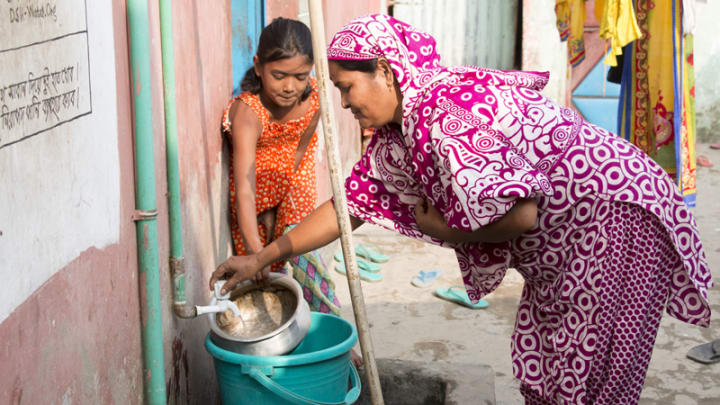
It is nighttime in Dhaka, Bangladesh. Rupa, who is 16, creeps to a secluded place away from her home to wash her sanitary cloth and change her clothes. She is in the middle of her menstrual cycle, and must walk a long way to the nearest hand pump tubewell to get clean water for washing. All by herself and out in the open, Rupa knows she is vulnerable to sexual assault or rape, but she is willing to live under the threat of violence in the dark, rather than bear the stares of strangers in the daytime.
While Rupa’s story is fictionalized, it is representative of the plight of many young women who lack access to water and sanitation. Lack of access to safe water and adequate sanitation disproportionately impacts women and girls, particularly when it comes to menstrual hygiene management. With no access to a toilet at home, they are forced to manage their monthly cycles in unsanitary, unsafe conditions, and miss school due to poor understanding of proper hygiene management. To complicate matters further, girls like Rupa can’t talk about menstruation with their mothers, as it’s a taboo subject within their community.
Access to water changes lives
Access to water has proven to be a critical tool in the empowerment of adolescent girls in developing nations, where 1 in 10 people lack access to clean water and sanitation. In Dhaka, 85 percent of urban slum residents do not have access to safe water.
In 2009, Johnson & Johnson began a partnership with Water.org to bring hygiene education to thousands of people in Bangladesh through WaterCredit, a microfinance tool that provides small, affordable loans so families can access safe water and sanitation. From this partnership, we learned the importance of focusing more deeply on the needs of adolescent girls, particularly in the area of menstrual hygiene management, education and training. The hope is that women and girls in Dhaka will feel more confident and comfortable in managing their monthly cycles and better access to water will greatly improve their sense of safety.
Access to water and sanitation is not only a matter of health, it’s also a matter of dignity and equality. In a study conducted by Water.org, more than 98 percent of program participants reported improvements in their water and sanitation conditions, including increased accessibility, reliability, safety and privacy. The study further found that 79 percent of participants reported economic gains, with 24 percent of those gains attributed to excess time for women to pursue productive activities. In other words, access to water created a ripple effect, leading to improved health and economic opportunity.
May 28 marks Menstrual Hygiene Day. Menstruation matters. It matters for every young woman like Rupa who desires and deserves safe access to clean water and sanitation so that managing her monthly cycle becomes just a normal part of life. So that she can focus on going to school and fulfill her potential.
This Menstrual Hygiene Day, take the time to learn more. Follow the conversation on Twitter using the hashtag #MenstruationMatters.
Join the Devex community and access more in-depth analysis, breaking news and business advice — and a host of other services — on international development, humanitarian aid and global health.
